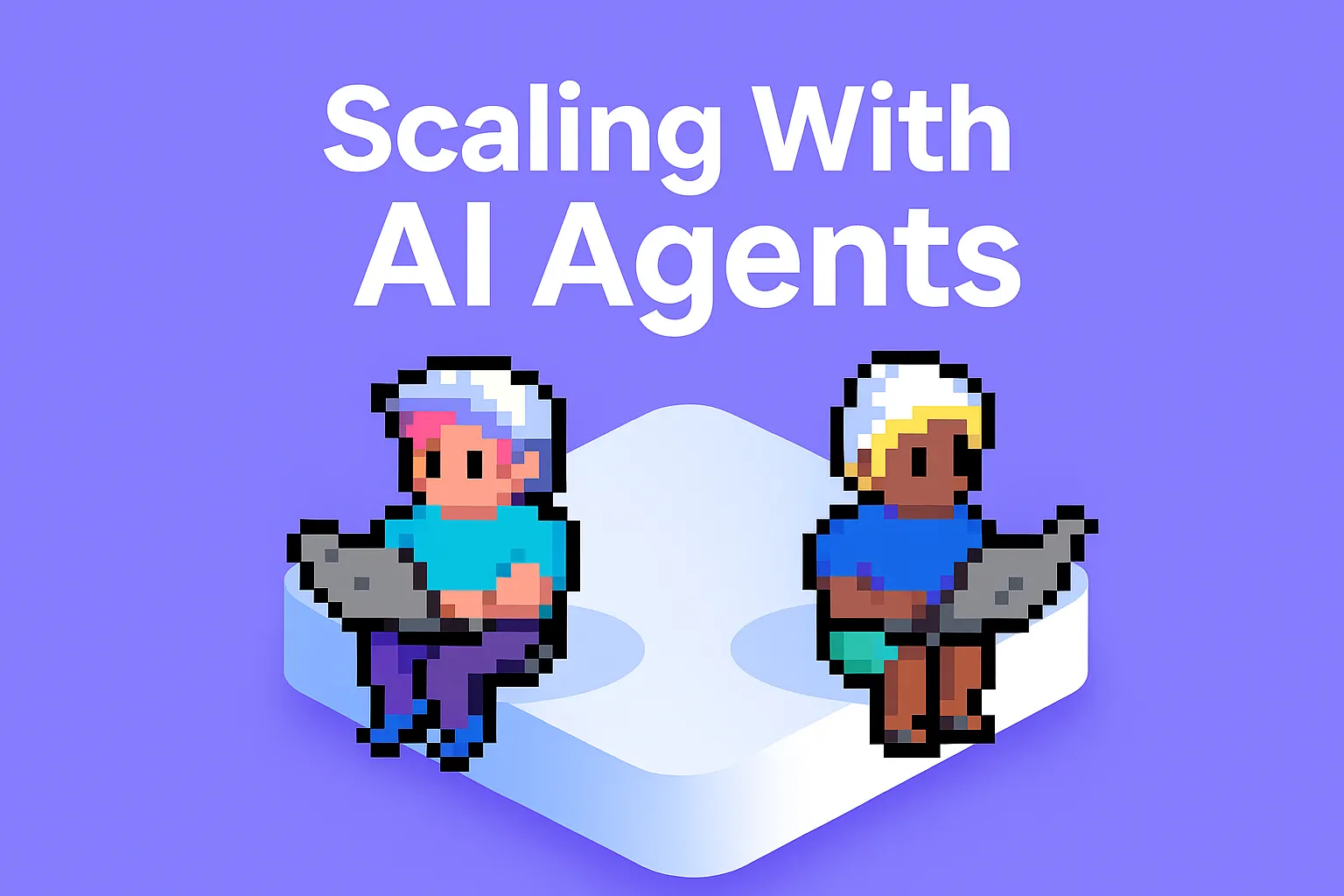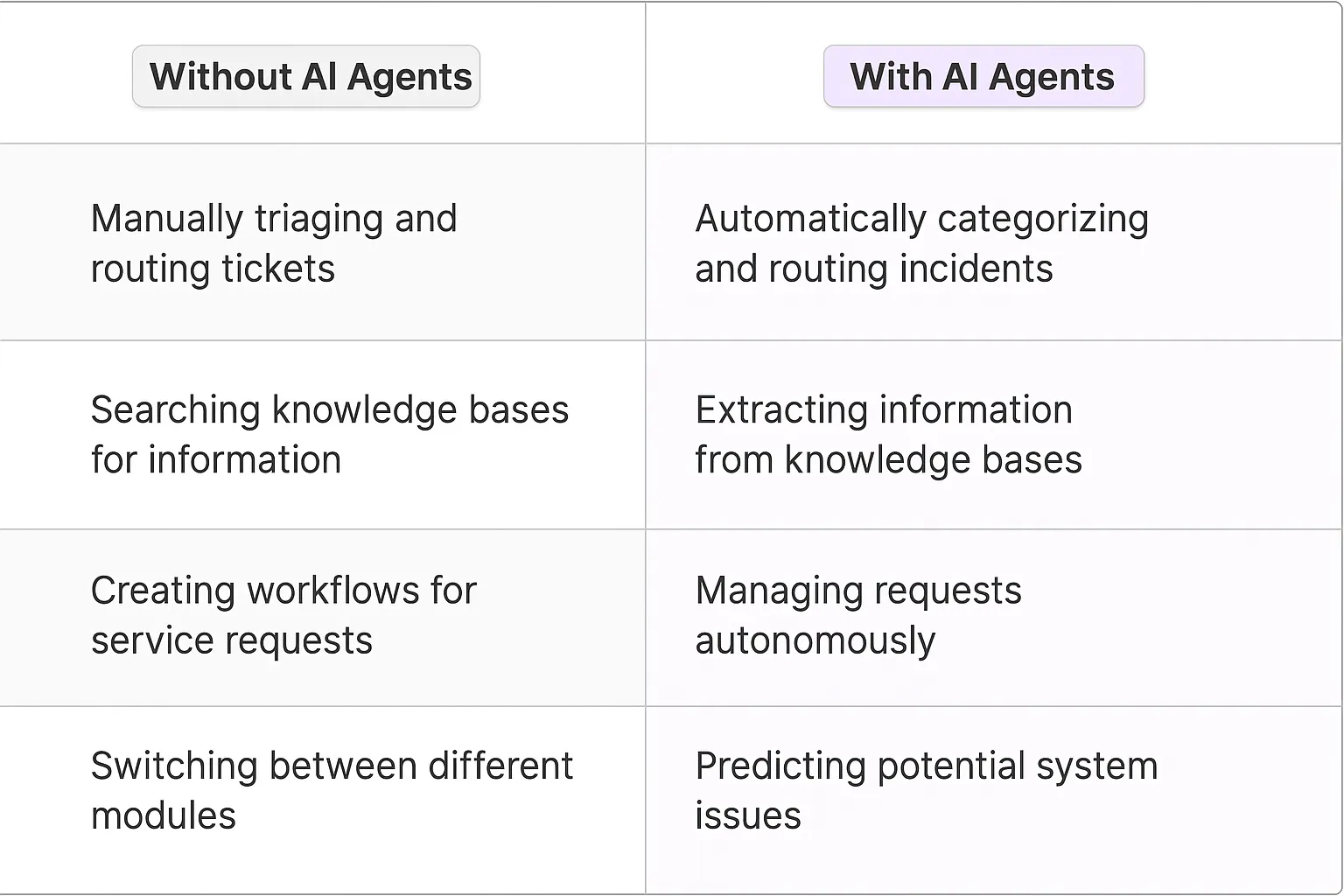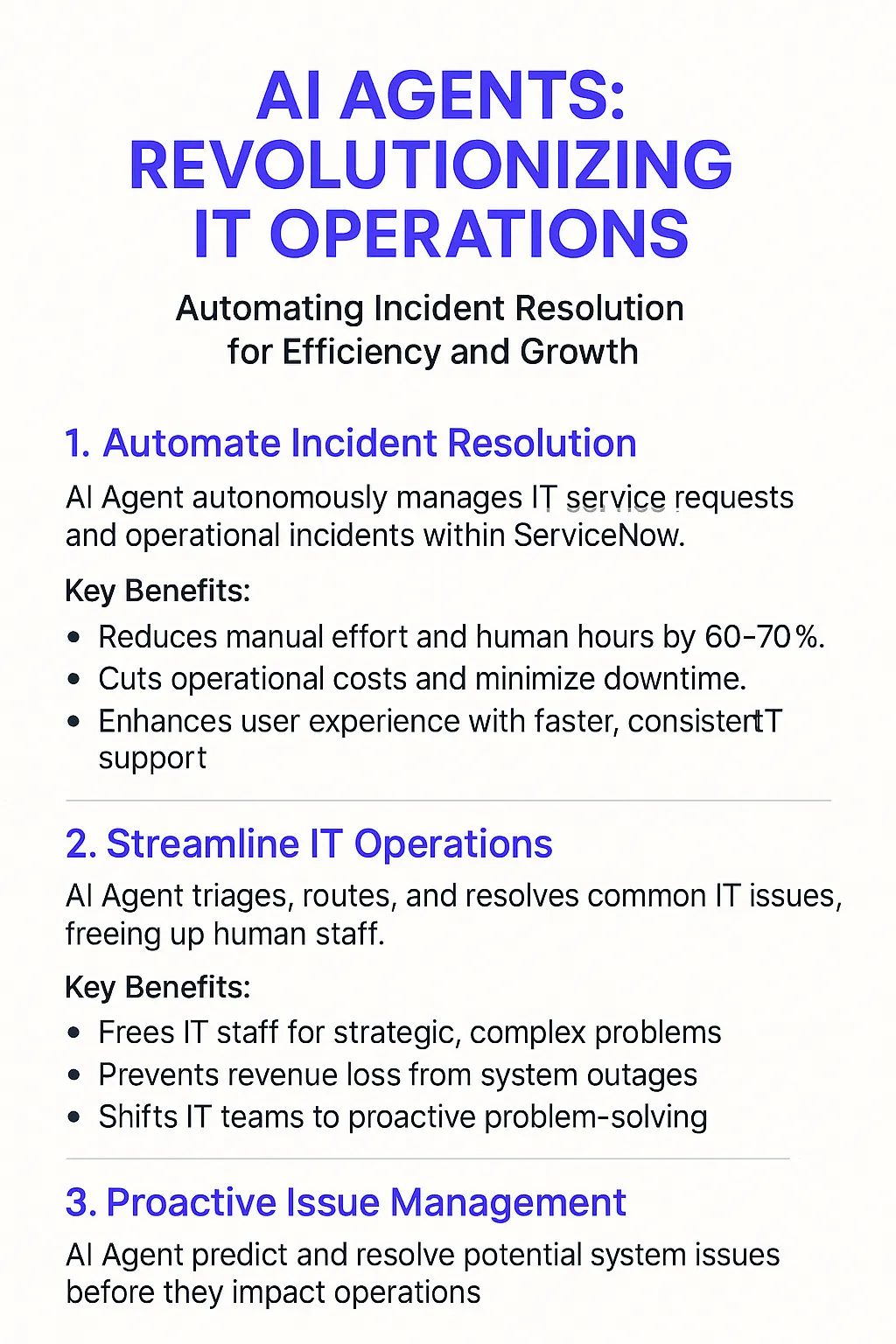ServiceNow
Understanding ServiceNow's Enterprise Platform and Core Features
ServiceNow stands as an enterprise platform that connects people, functions, and systems across organizations. At its core, it's a digital workflow platform that helps organizations manage all aspects of their IT infrastructure, employee services, and business operations. The platform has evolved from its IT service management roots into a comprehensive enterprise solution that powers digital transformation initiatives across industries.
Key Features of ServiceNow
The platform excels in several critical areas:
- IT Service Management (ITSM) for incident, problem, and change management
- IT Operations Management (ITOM) for infrastructure and cloud resources
- IT Business Management (ITBM) for project portfolio optimization
- Employee workflows for HR service delivery
- Customer service management for external support operations

Benefits of AI Agents for ServiceNow
What would have been used before AI Agents?
ServiceNow traditionally relied on manual ticket routing, knowledge base searches, and human agents handling every IT service request. Teams spent countless hours writing scripts, creating workflows, and managing repetitive tasks. Support staff had to constantly switch between different modules and manually update tickets, while end users waited in queue for basic service requests.
What are the benefits of AI Agents?
AI Agents transform ServiceNow from a ticket management system into an intelligent digital operations platform. These digital teammates can handle complex service requests end-to-end, from initial triage to resolution, learning from each interaction to become more effective.
The most significant impact comes from their ability to understand context across the entire ServiceNow ecosystem. When an employee submits an access request, AI Agents automatically check security policies, verify approvals, and provision access - tasks that previously required multiple human touchpoints and days of wait time.
For IT teams, AI Agents serve as force multipliers by:
- Automatically categorizing and routing incidents based on historical patterns
- Extracting relevant information from knowledge bases to suggest solutions
- Predicting potential system issues before they impact users
- Managing routine password resets and access requests autonomously
The real power emerges when AI Agents handle complex workflows across different ServiceNow modules. They can coordinate between IT Service Management, IT Operations Management, and IT Business Management - creating a seamless experience that was previously impossible with human-only teams.
For organizations running ServiceNow, AI Agents reduce mean time to resolution by 60-70% while maintaining high accuracy rates. This translates to massive productivity gains as support staff can focus on strategic projects instead of routine tickets.

Potential Use Cases of AI Agents with ServiceNow
Processes
ServiceNow AI Agents transform IT service management by handling complex incident management chains. When critical system alerts trigger, these digital teammates automatically categorize severity levels, route tickets to appropriate teams, and initiate response protocols - all while maintaining detailed documentation of each step.
Change management workflows benefit from AI Agents that evaluate risk levels of proposed system changes. They analyze historical data patterns, assess potential impacts across connected services, and provide evidence-based recommendations to change advisory boards.
For asset lifecycle management, AI Agents monitor hardware and software inventories, predict end-of-life dates, and proactively generate procurement requests. They track usage patterns and compliance requirements, ensuring organizations maintain optimal resource levels without over-provisioning.
Tasks
Password resets and access management requests consume significant IT resources. AI Agents verify user identities, check security policies, and execute resets according to established protocols - reducing resolution times from hours to minutes.
When employees encounter software issues, AI Agents analyze system logs, compare against known error patterns, and either implement fixes directly or create detailed troubleshooting guides for support teams. This targeted approach eliminates redundant troubleshooting steps.
For onboarding processes, AI Agents orchestrate the setup of new employee accounts across multiple systems. They ensure proper access levels, equipment provisioning, and training resource allocation based on role requirements and departmental policies.
Service catalog management becomes more dynamic with AI Agents that analyze request patterns and usage data. They identify opportunities to consolidate or expand service offerings, update documentation based on user feedback, and maintain accurate service level agreements.
In vendor management scenarios, AI Agents track contract renewals, monitor service level compliance, and aggregate performance metrics. They flag potential issues before they impact operations and maintain audit-ready documentation of all vendor interactions.

Industry Use Cases
ServiceNow AI agents are transforming how organizations operate across sectors, moving beyond basic automation into truly intelligent process optimization. Drawing from my experience working with enterprise SaaS companies, I've observed these digital teammates becoming essential parts of modern IT operations.
The real power lies in how these AI agents adapt to industry-specific challenges. They don't just handle generic tasks - they learn the unique language, compliance requirements, and operational nuances of each sector. Whether it's healthcare providers managing patient data workflows or financial institutions processing complex transactions, these AI agents become specialized experts in their domains.
What's particularly fascinating is how ServiceNow AI agents create compounding value over time. As they interact with industry-specific processes, they build up a knowledge base that makes them increasingly effective at handling specialized tasks. This creates a powerful network effect where each interaction improves the overall system capability.
Let's explore how different industries are leveraging these capabilities to create measurable business impact and transform their operations in ways that weren't possible just a few years ago.
Healthcare: AI Agents Transform Patient Care Management
The healthcare industry faces massive coordination challenges across patient care management, scheduling, and administrative tasks. ServiceNow AI Agents are transforming how healthcare providers handle these complex workflows, particularly in patient care management.
Take a major hospital network managing thousands of patient appointments daily. Their ServiceNow AI Agent acts as a digital care coordinator, monitoring patient schedules, test results, and follow-up requirements. When lab results come in, the AI agent automatically reviews them against predetermined thresholds and clinical guidelines. For concerning results, it immediately notifies the appropriate care team members and begins orchestrating next steps - whether that's scheduling follow-up appointments, ordering additional tests, or flagging cases for urgent review.
The AI agent's deep integration with electronic health records means it can spot patterns human coordinators might miss. For instance, if a patient has missed several appointments and has declining test results, the AI flags this correlation and elevates the case. It then proactively reaches out to both the care team and patient with appointment options that work for everyone's schedules.
Beyond individual patient care, these AI agents analyze population-level health data to identify trends requiring preventive intervention. They can detect when certain patient groups are overdue for screenings or when appointment wait times in specific departments are growing too long.
The results are compelling: Healthcare providers using ServiceNow AI Agents report 40% faster patient follow-up times and a 60% reduction in missed appointments. More importantly, they're catching critical health issues earlier and ensuring patients get timely care when they need it most.
This shift from reactive to proactive patient care management demonstrates how AI agents can augment healthcare teams while maintaining the human touch essential to quality care delivery.
Financial Services: AI Agents Redefine Risk Management and Compliance
The financial services industry operates in a complex web of regulations, risk factors, and time-sensitive decisions. ServiceNow AI Agents are becoming the critical nerve center for banks and investment firms managing these intricate challenges.
A global investment bank deployed ServiceNow AI Agents to transform their risk management operations. The AI agent continuously monitors trading activities, transaction patterns, and market indicators across multiple asset classes. When it detects unusual patterns or potential compliance issues, it doesn't just flag them - it initiates a sophisticated response chain.
For example, when the AI agent spots a series of trades that could trigger regulatory thresholds, it automatically aggregates relevant data points, including historical patterns, trader profiles, and market conditions. It then routes this analysis to compliance officers with specific recommendations based on previous similar scenarios and current regulations.
The system's ability to learn from each interaction means it gets smarter about distinguishing between genuine risks and false positives. One major bank found their AI agents reduced false positive alerts by 75%, allowing their risk teams to focus on legitimate threats.
Beyond reactive monitoring, these AI agents excel at predictive risk assessment. They analyze vast datasets to identify emerging risk patterns before they become problems. For instance, by correlating market volatility data with client portfolio compositions, the AI can proactively suggest portfolio rebalancing to maintain risk compliance.
The numbers tell a compelling story: Financial institutions using ServiceNow AI Agents report 85% faster risk incident resolution and 90% improvement in regulatory reporting accuracy. But perhaps most importantly, they're preventing problems before they occur, shifting from a defensive to a strategic risk management posture.
This transformation in risk management and compliance showcases how AI agents can handle immense complexity while empowering human experts to make better-informed decisions.
Considerations and Challenges
Implementing AI agents in ServiceNow requires careful planning and awareness of several key challenges that organizations commonly face. The complexity goes beyond simple configuration and demands a strategic approach to both technical and operational aspects.
Technical Challenges
Data quality stands as a primary technical hurdle. ServiceNow AI agents rely heavily on clean, structured data to function effectively. Organizations often discover their historical ticket data contains inconsistencies, duplicate entries, and non-standardized formatting that can impair the AI's learning capabilities.
Integration complexity presents another significant challenge. ServiceNow environments frequently connect with multiple systems and databases. Each integration point requires careful consideration of data flows, API limitations, and potential latency issues that could impact the AI agent's performance.
Security protocols and compliance requirements can also limit AI functionality. Organizations must carefully balance the AI agent's access to sensitive information while maintaining regulatory compliance, particularly in industries like healthcare or finance.
Operational Challenges
Change management proves crucial yet challenging when implementing ServiceNow AI agents. Support teams often show resistance to working alongside digital teammates, fearing job displacement or disruption to established workflows. Creating a culture of collaboration between human teams and AI requires dedicated training and clear communication about roles and responsibilities.
Performance monitoring presents unique difficulties. Traditional metrics like ticket resolution time may not fully capture the AI agent's impact. Organizations need to develop new KPIs that accurately reflect the hybrid human-AI support environment while maintaining service quality standards.
Maintenance and optimization demand ongoing attention. AI agents require regular training with new data, performance monitoring, and adjustments to handle evolving service requests. Organizations often underestimate the resources needed for continuous improvement and adaptation of their AI implementations.
Cost management becomes complex as organizations scale their AI operations. While AI agents can reduce certain operational costs, expenses related to licensing, training, and maintenance can accumulate quickly without proper planning and oversight.
The Future of Intelligent Enterprise Service Management
The integration of AI Agents into ServiceNow marks a pivotal evolution in enterprise service management. These digital teammates don't just automate tasks - they fundamentally transform how organizations operate, making decisions and handling complex workflows with unprecedented efficiency. The real value emerges in the compound effects: reduced resolution times, improved accuracy, and freed-up human capacity for strategic work. As organizations continue to adopt and optimize these AI capabilities, we're seeing the emergence of truly intelligent enterprises where human expertise and AI capabilities combine to deliver exceptional service experiences.













